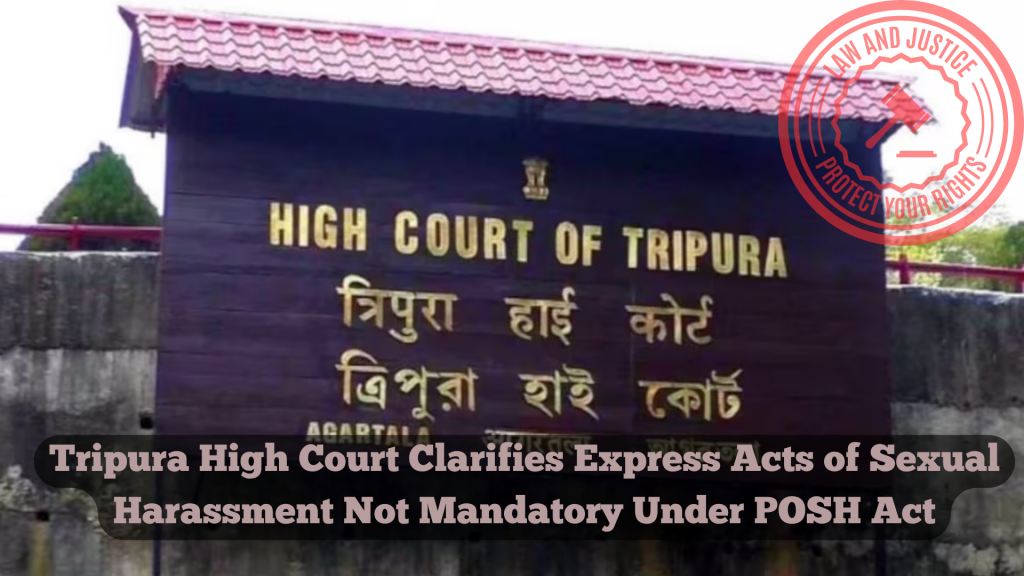
Tripura High Court Clarifies Express Acts of Sexual Harassment Not Mandatory Under POSH Act
Judgement Given On : 01/02/2022
In the case of VKR vs. The Union of India and Others (2022), the Tripura High Court delivered a crucial judgment, affirming that the victim’s complaint under the Sexual Harassment of Women at Workplace (Prevention, Prohibition, and Redressal) Act, 2013 (POSH Act) need not explicitly mention instances of sexual harassment. The court clarified that the act’s definition of sexual harassment is inclusive and covers both direct and implied acts.
Background:
VKR (the petitioner) held the position of IT Range, Agartala, and had additional responsibility as the head of Group Centre Central Reserve Police Force (CRPF). The complainant, a member of the CRPF, reported that the petitioner had harassed her by demanding her personal mobile number, sending informal messages, and making irrelevant phone calls.
Furthermore, the petitioner’s wife had also allegedly threatened and insulted the complainant. The victim reported these incidents via email to the Director General (DG), leading to the formation of a Sector Level Complaints Committee (SLCC) under the POSH Act, 2013.
Dissatisfied with the SLCC’s inquiry report, the petitioner approached the Tripura High Court.
Key Contentions:
- The complaint did not meet the criteria outlined in Section 2(n) of the POSH Act, 2013.
- There was a delay in filing the complaint, violating Section 9 of the POSH Act, 2013.
- The complainant’s husband could not file the complaint on her behalf since she did not have any legal disability.
- The petitioner cited Section 11(4) to challenge the validity of the inquiry committee’s proceedings, asserting that they exceeded the 90-day timeframe.
- The petitioner contended that without the concerned Minister’s permission, no charge sheet could be issued against him as he held a high-ranking IPS officer position.
- The appointment of the Chairperson raised concerns about irregularity.
Court’s Observations:
Contention 1:
The court emphasized that the definition of sexual harassment in Section 2(n) of the POSH Act, 2013, is inclusive rather than exhaustive. It covers acts and behaviors, whether done directly or by implication. Therefore, explicit instances of sexual harassment in the complaint were not obligatory. During the inquiry, it was revealed that the petitioner had made unwelcome advances and remarks on the complainant’s appearance, which constituted sexual harassment.
Contention 2:
The court noted that questions of delay should be addressed by the Internal Complaints Committee, not the court, at an interim stage of the proceedings.
Contention 3:
It was found that the complaint had been filed by the complainant herself, as evidenced by the complaint’s content and the fact that it was sent from her email address.
Contention 4:
The court clarified that Section 11(4) does not impose a mandatory time limit accompanied by penal consequences for non-compliance. Instead, it emphasizes the seriousness of sexual harassment cases and aims for swift resolution. The time limit in Section 11(4) should not be seen as an absolute cutoff point for inquiries.
Contention 5:
This requirement did not apply in the present case since a SLCC was constituted, and no departmental charge sheet had been issued.
Contention 6:
The court concluded that Smt. Barnali Goswami had already been appointed as the Chairperson, and any subsequent formal amendment by the department did not render her participation in the proceedings unauthorized. As a result, the petition was dismissed
